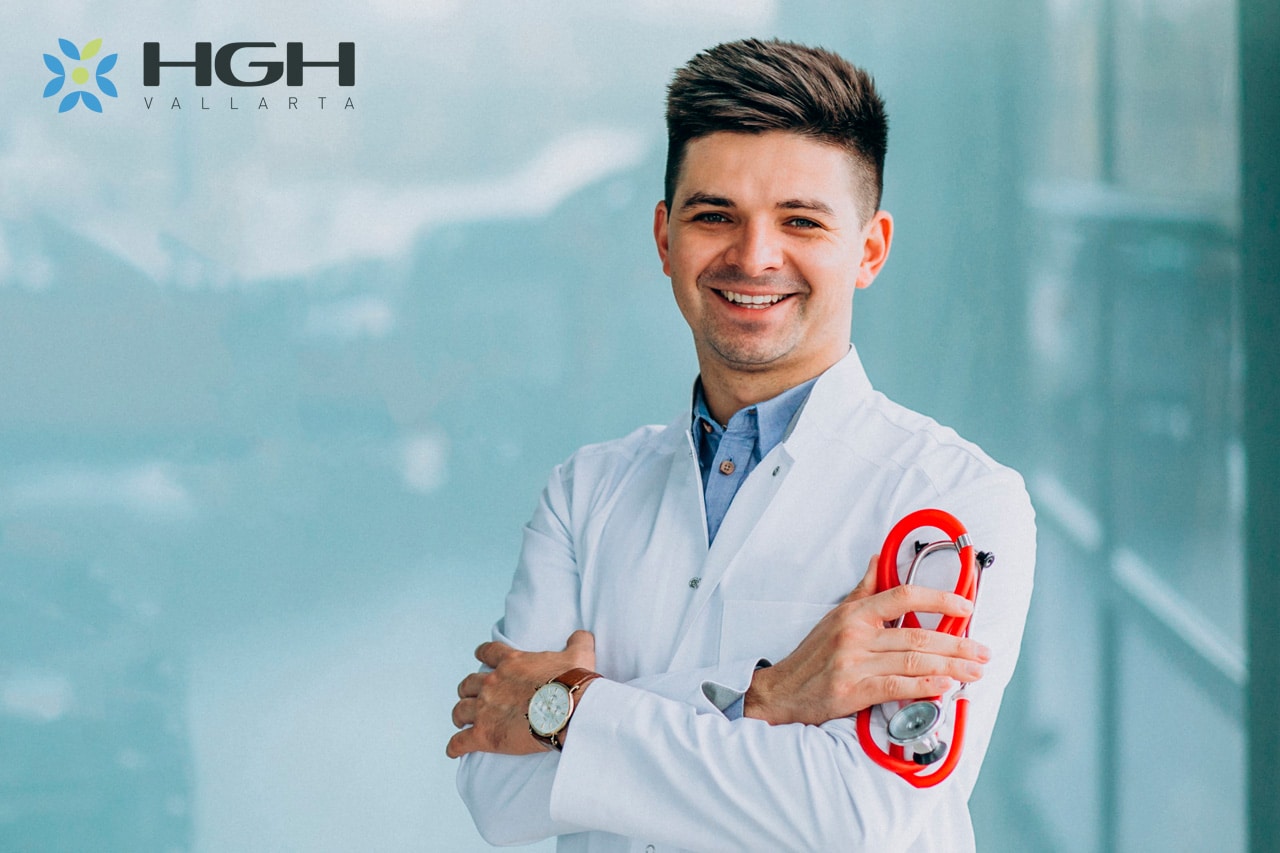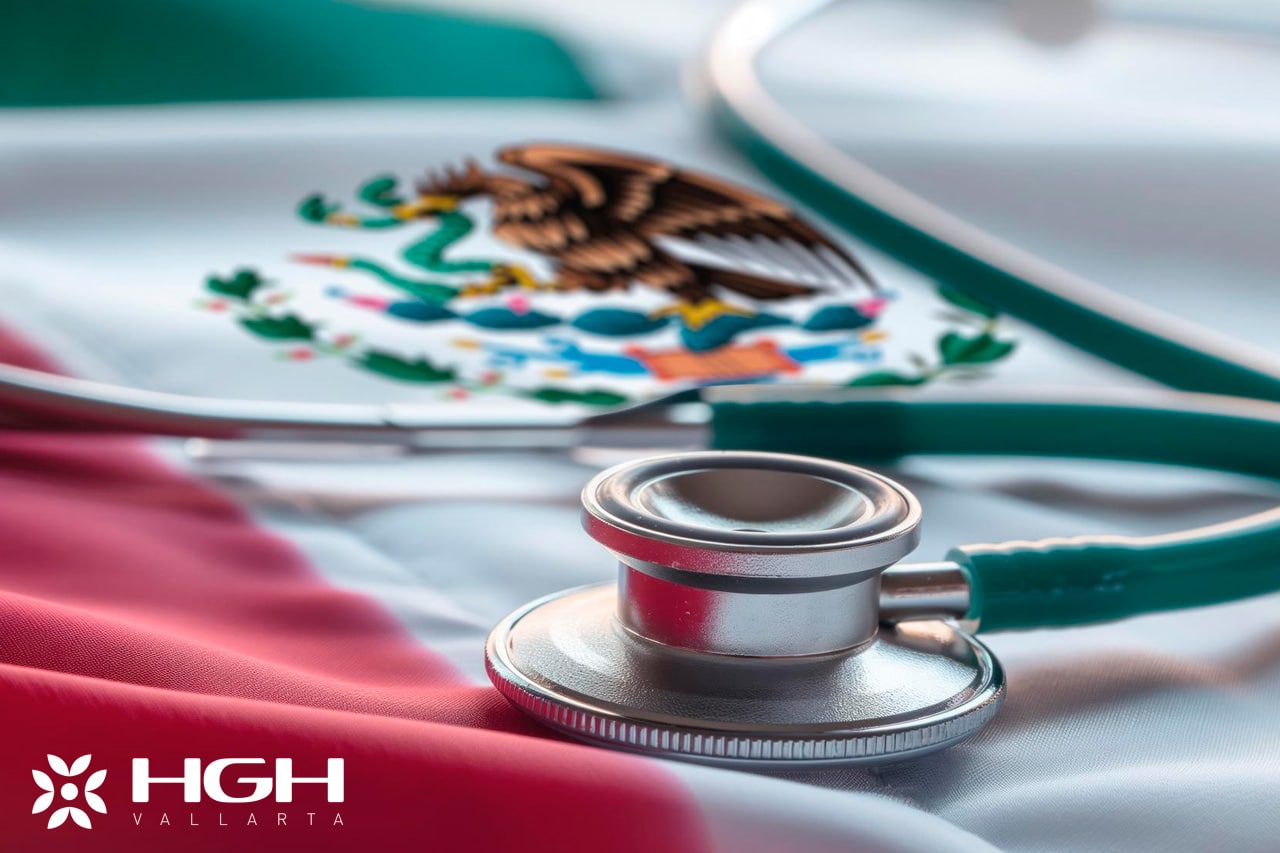Growth Hormone Therapy: Benefits and Laws in Mexico
Human Growth Hormone (HGH), or somatotropin, is a powerful, naturally occurring hormone the pituitary gland produces. It plays a vital role in growth, metabolism, and body composition and is pivotal in overall health.
HGH is essential during childhood to promote growth. Still, it continues to serve crucial functions throughout life by influencing the body’s ability to metabolize proteins, fats, and carbohydrates and maintaining healthy tissue in organs and muscles. HGH also regulates our metabolism, enhancing muscle function, supporting tissue repair, and contributing to:
- Optimal growth and development: Ensuring healthy development and growth in children.
- Enhanced Metabolic Function: Improves the patient’s ability to burn fat, build muscle, and maintain energy levels.
- Stronger Bones and Joints: Promoting bone health and reducing the risk of Osteoporosis and arthritis.
- Improved Cardiovascular Health: Promoting cardiovascular health through cholesterol reduction and enhanced blood flow.
- Enhanced Cognitive Function: HGH injections can improve memory and concentration by supporting brain health and cognitive function.
- Increased Energy and Vitality: HGH replacement therapy promotes well-being by boosting energy levels.
When the body fails to produce enough HGH, a condition known as growth hormone deficiency can arise. Growth Hormone deficiency leads patients to experience various health challenges in both children and adults. Fortunately, medical advances have made HGH therapy a viable treatment for hormone deficiency and other related conditions. HGH therapy can restore HGH levels, helping individuals achieve optimal health and quality of life.
Helping Children reach their full potential: Benefits of Human Growth Hormone Therapy

HGH therapy is approved to treat conditions that result in poor growth or short stature in children. HGH can help children achieve a more typical height and improve their overall physical development in these cases.
Conditions that benefit from HGH therapy in children include:
- Turner’s Syndrome: A genetic disorder in girls that leads to short height, heart defects, and ovarian failure.
- Prader-Willi Syndrome: A genetic condition characterized by low muscle tone, persistent hunger, and abnormal hormone levels.
- Chronic Kidney Disease: When the kidneys cannot function correctly, this can inhibit average growth, and HGH therapy can promote better growth outcomes.
- Growth Hormone Deficiency: Some children have insufficient levels of HGH, which can result in delayed growth.
- Children Born Small for Gestational Age: If children born small do not catch up in growth after birth, HGH therapy can help them reach their full height potential.
The Impact of HGH Therapy:
- Improve growth outcomes: Helping children achieve a more typical height and stature.
- Enhance physical development: Promoting stronger bones, muscles, and overall physical health.
- Improve quality of life: Enabling children to participate more fully in activities and enjoy better well-being.
By addressing the underlying causes of growth challenges, HGH therapy can provide a valuable tool for helping children reach their full potential and live healthier, more fulfilling lives.
HGH Therapy for Adults: Restoring Vitality and Well-being

Although HGH is often associated with childhood growth, Human Growth Hormone (HGH) also plays a vital role in adult health and well-being. A deficiency in HGH in adulthood can result from various conditions, some of which can develop over time, including:
- Pituitary Tumors: Non-cancerous tumors of the pituitary gland can impair its ability to produce adequate HGH, leading to hormone deficiency.
- Radiation Therapy or Surgery: Treatments for pituitary tumors or other conditions that require radiation or surgery near the brain can damage the pituitary gland, affecting its ability to produce HGH.
- Traumatic Brain Injuries: Head injuries, particularly those that cause trauma to the hypothalamus or pituitary gland, can lead to a reduction in HGH production.
- Aging: HGH production naturally declines with age. Although this does not classify as growth hormone deficiency, some adults experience reduced levels of HGH, which can impact their quality of life, particularly regarding energy levels, metabolism, and muscle mass.
Symptoms and Detection of Adult Growth Hormone Deficiency
Detecting HGH deficiency in adults is crucial for addressing various health concerns. Some common signs of growth hormone deficiency in adults include:
- Decreased Muscle Mass: Adults with HGH deficiency may notice muscle strength and endurance reduction.
- Increased Body Fat: Reduced HGH levels can affect the body’s metabolism, increasing fat, particularly around the abdomen.
- Reduced Bone Density: HGH plays a role in bone health, and a deficiency can result in weaker bones and an increased risk of Osteoporosis and fractures.
- Chronic Fatigue: Adults with HGH deficiency may experience persistent tiredness and a general lack of energy.
- Cognitive Decline: Reduced HGH levels can contribute to cognitive difficulties, such as poor concentration, memory problems, and mood swings.
A doctor will often diagnose growth hormone deficiency by evaluating these symptoms, reviewing medical history, and conducting specialized tests such as a growth hormone stimulation test. Blood tests may also measure insulin-like growth factor 1 (IGF-1) levels, reflecting the body’s HGH production. If deficiency is confirmed, our doctors can recommend HGH therapy to help improve these symptoms and overall health.
Benefits of HGH Therapy in Adults
HGH therapy offers a range of benefits for adults with diagnosed HGH deficiency. It can help improve overall body composition by:
- Increasing Muscle Mass: HGH stimulates the growth of lean muscle tissue, which can help individuals build strength and improve physical performance.
- Reducing Fat: HGH plays a vital role in fat metabolism. With proper therapy, adults may experience a reduction in body fat, particularly in the abdominal area.
- Improving Bone Density: By stimulating bone metabolism, HGH helps maintain and increase bone density, reducing the risk of fractures and Osteoporosis.
- Boosting Energy Levels: HGH therapy can help alleviate feelings of fatigue and low energy, improving overall vitality.
- Enhancing Mental Clarity: Some patients report improved cognitive function and mood after starting HGH therapy, which can lead to better mental focus and an improved sense of well-being.
These positive effects make HGH therapy a powerful tool for enhancing the quality of life for individuals with growth hormone deficiency.
Legal Status of HGH in the United States: laws and regulations

In the U.S., strict and restrictive laws regulate medicine and medical treatment. HGH is a Schedule III classified controlled substance under the Anabolic Steroid Control Act. Human Growth Hormone is tightly regulated and can only be obtained legally with a prescription for approved medical uses. These include growth hormone deficiency, muscle-wasting diseases, and short bowel syndrome. Any use of HGH outside of these approved conditions, such as for athletic performance enhancement or anti-aging, is illegal within the U.S..
The Food and Drug Administration (FDA) in the U.S. monitors the production and distribution of HGH, ensuring safe and appropriate distribution. The World Anti-Doping Agency (WADA) and most sports organizations have banned hormone therapy use for athletes due to its performance-enhancing effects.
Exploring Growth Hormone Therapy in Mexico: Why is HGH legal in Mexico?
While HGH is also classified as a controlled substance in Mexico, Mexico’s regulations on HGH and other medical treatments make the country the leading medical tourism destination in Latin America. Legally, there is greater flexibility in growth hormone prescription and distribution than in the U.S. Human growth hormones are regulated substances in Mexico, obtained with a prescription. Some individuals seek safe and affordable treatment in Mexico due to the comparative ease of acquiring the hormone and the country’s legal approach.
The less stringent regulations in Mexico’s medical field mean that legal HGH is more readily available for uses beyond those approved in the U.S., such as for anti-aging or general wellness purposes. Affordability and access have led to an increase in medical tourism, where individuals travel to Mexico to obtain HGH therapy for treatments that are not allowed within the U.S. and Canada.
Growth Hormone: an anti-aging option in Mexico
While HGH therapy is not FDA-approved for anti-aging purposes, some adults seek it to counteract the natural decline in HGH that occurs with age. Reduced HGH levels are associated with increased body fat, decreased muscle mass, and reduced energy. HGH therapy has the potential to reverse some of these effects, making it an appealing option for those seeking to maintain a youthful appearance and vitality.
Hopeful Prospects for HGH Therapy
Research on HGH continues to evolve, and there is optimism about its future therapeutic applications. Scientists are investigating new ways to harness the benefits of HGH, especially in areas like:
- Rehabilitation after injury: Growth hormone may help patients recover from major surgeries or traumatic injuries by speeding up tissue repair and improving muscle function.
- Metabolic health: HGH therapy explores the potential to improve metabolism, especially in individuals with metabolic disorders or obesity.
- Anti-aging therapies: there is ongoing expert research into how HGH injections can be applied safely to anti-aging treatments.
Expert institutions like the Mayo Clinic and the Cleveland Clinic continue researching the best uses for HGH in children and adults, ensuring that patients can benefit from its therapeutic potential.
Mexico as a medical tourist destination: Why is HGH legal in Mexico?

Human Growth Hormone (HGH) has a well-established role in treating growth hormone deficiency and improving the quality of life for those affected. Whether for children experiencing poor growth or adults with metabolic and energy issues, HGH therapy offers a promising solution for restoring balance to the body.
While HGH is highly regulated in the U.S. and classified as a controlled substance, it remains a valuable medical therapy when prescribed for legitimate health concerns.
Why is HGH legal in Mexico? Mexico’s regulatory differences make growth therapies safe, accessible, and affordable. Mexico’s high-quality, low-cost medical treatments and quick turnaround times make it the leading medical tourism destination in Latin America.
HGH therapy in Mexico can provide hope and improved health for those suffering from hormone deficiency. As research progresses, the therapeutic possibilities for HGH are expanding, offering exciting prospects for future treatments.
Experience personalized growth hormone therapy at HGH Vallarta. Our expert team provides safe, effective, and compassionate care. Together, we will improve your quality of life and accompany you on every step of your journey.











